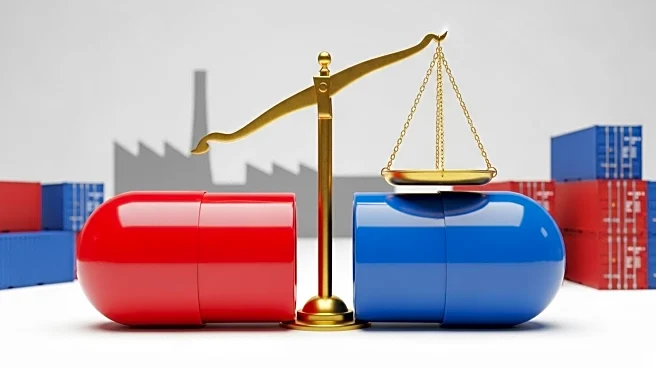What's Happening?
President Trump has announced a new trade policy imposing a 100% tariff on all imported branded or patented pharmaceutical products, effective October 1, 2025. This decision aims to incentivize domestic production of pharmaceuticals, with the president stating the need for pharmaceuticals to be made in the United States. The Department of Commerce is expected to announce the details of these tariffs, which will cover a broad range of drugs and ingredients. Companies can avoid these tariffs if they have begun constructing manufacturing facilities within the U.S. This policy introduces significant challenges for pharmaceutical companies, affecting manufacturing strategies and supply chains. Major pharmaceutical companies have already committed substantial investments in U.S.-based manufacturing infrastructure in anticipation of such policy shifts.
Why It's Important?
The imposition of a 100% tariff on imported pharmaceuticals is a significant move that could reshape the pharmaceutical industry in the United States. It is likely to increase production costs and affect the availability of drugs, potentially leading to higher prices for consumers. The policy aims to boost domestic manufacturing, which could create jobs and strengthen the U.S. economy. However, it also presents challenges for companies that rely on global supply chains and may lead to inefficiencies if manufacturing sites are built solely to avoid tariffs. The uncertainty surrounding the implementation of these tariffs could hinder investment decisions and complicate regulatory compliance for pharmaceutical companies.
What's Next?
Pharmaceutical companies are expected to accelerate their investment in U.S. manufacturing facilities to avoid the tariffs. The FDA's PreCheck initiative may play a crucial role in facilitating the construction of new sites by streamlining regulatory processes. Companies will need to navigate the complexities of technology transfer and scalability to establish new production lines. The industry will closely monitor the Department of Commerce's announcement for clarity on the tariff details and potential exemptions. The policy could also influence other countries to adopt similar strategies, impacting global trade dynamics in the pharmaceutical sector.
Beyond the Headlines
The tariff policy raises ethical and legal questions about market access and the balance between domestic production and global trade. It could lead to a reevaluation of the pharmaceutical industry's reliance on international supply chains and prompt discussions on the sustainability of onshoring initiatives. The policy may also affect the development of pharmaceutical alternatives approved under the 505(b)(2) pathway, which are close to generics and offer advantages such as improved patient compliance and reduced drug costs.











